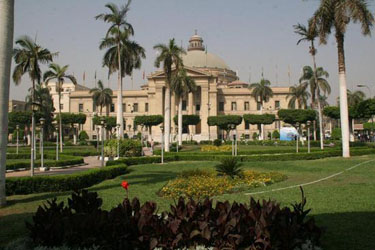Over the past 100 years, remark-able figures have graduated from Cairo University, using the knowledge they acquired there to make their mark on the country and the world at large. Three of them have won the Nobel Prize; dozens hold important political positions and countless others have offered their services in various academic and professional fields.
With a long and glamorous history and a journey full of triumphs and struggles, Cairo University occupies an unparalleled position of prestige among the most important Arab and international universities. Throughout its history, the rulers of Egypt from king Fouad I through previous president Hosni Mubarak have recognized and worked to foster the university’s scientific and cultural contributions.
Egypt’s most distinguished university began a yearlong celebration of its centennial on December 21, 2007, by awarding alumnus Mohamed El-Baradie, win-ner of the 2005 Nobel peace Prize and former law student at the university, an honorary doctorate degree. El-Baradie heralded the university as “the breeding ground for Egypt’s elite in natural and social sciences elite that carried the torch of rational thinking and modernity honored another influential alumnus, sheikh sultan Al Kasemy, the governor of the UAE emirate Al-Sharjah, awarding him a position as part time professor.
The 2007 celebration also included the signing of pact between Cairo University and the association of the universities of Islamic countries, an international organization based in morocco, to enhance cultural dialogue between students of universities in the Islamic world.
Throughout the year, Cairo University various faculties have also been staging a number of athletic and cultural performances. The festivities are culminating in a gala centennial ceremony on December 21, 2008, in the universities auditorium. The president and first lady are expected to attend the December 21 celebration, which also includes a ceremony honoring the university outstanding alumni.
Funded by donations from city residents, cairo university, which was originally known as university of king fouad was established as the first Egyptian university independent from British control in 1908. The university was first housed within Janaklis Palace, which was also later used as a campus for the American University in Cairo when it was established in 1919.
Cairo University moved to its current location in Giza in 1928 after King Ahmed Fouad’s Sister Princess Fatima Ismail donated acres of her land in Bolaq El Dakrour; she also donated some of her jewelry, which raised LE 70,000 for the university.
In 1925, the university was renamed the Egyptian university. When prince fouad became king in 1940, the university became known as fouad I University after the 1952 revolution, the government renamed its Cairo University, operating under the ministry of education.
Our university is unquestionable the most important of all the Egyptian universities with regards to its scientific research and the quality of eduation it offers; says hossam kamel, Cairo university’s current president. Kamel, who is the graduate of the faculty of dentistry, was the university’s vice president for two years before assuming the university’s top post in august 2008.
When private universities began cropping up in Egypt, many wondered whether they would diminish the Cairo University’s prestige and popularity. No so, kamel says. “The value of Cairo University can never be erased even with the existence of new universities, especially because the new ones do not have the resources Cairo University has for its scientific research”.
Kamel notes that many Cairo University graduates are now teaching at the nation’s private universities.
Ranked in the world’s top 500 by the center for world class universities, cairo University has 20 faculties and five scientific institutes, kamel says, adding that approximately 24,000 students graduate each year.
On of the university’s most important principles is that there is no room for racial discrimination the university is open to everyone regardless of gender, religion, nationality or color, says kamel. “Now girls represent 52 percent of the university students. In the past, we were trying to increase the percentage of women’s enrollment to reach equality between men and women by giving women important positions and rights. And ironically, nowadays, it is the other way around.”
Kamel is proud to be the twenty fifth president of the university after being one of its students. This position has historically been considered one of the most influential positions in Egypt and has been held by such important figures as prince ahmed fouad (who become king fouad), prince youssef kamal ande taha Hussein (who later became the ministry of education). The president’s office has not been changed since its foundation in the early 1900s.
The u niveristy now admits approximately 213,000 students each year, making for a very crowded campus. Kamel says that the university is currently working on shifting the syllabus and making the coursework available digitally, which will allow the students to study at home rather than attend class on the campus.
Also, according to kamel, a new university campus is under construction in sixth of October city west of Cairo. It will include a number of new centers in fields like nanotechnology and micro mechanical systems engineering, in addition to a postgraduate dentistry studies center and an institute for educational research.
The ministry of administrative development is also cooperating with Cairo University to establish an institute for administrative development. Another 740 acres is being allocated to build a so called education city for the university, where educational projects can be carried out in collaboration with other international universities.
Its all part of Cairo University’s commitment to the future, As El-baradie sums it up; “focusing on quality education and academic research is the road to our salvation”.




